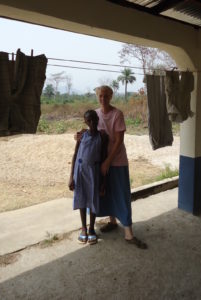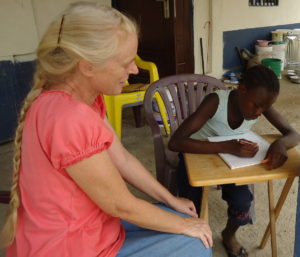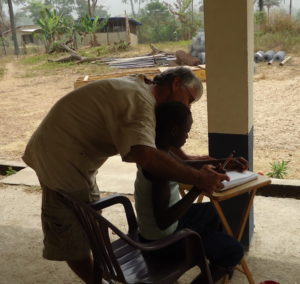Mercy Rejoiced
February 22, 2012, date of original journal entry.
For he shall have judgment without mercy, that hath shewed no mercy; and mercy rejoiceth against judgment. (James 2:13)
Margaret seems to have learned a lesson today. But, in fairness to her, I must confess that I first had to learn a lesson of my own.
I am all for authority. Rules, regulations, and, above all, consequences are part of my genetic make up. Rigid would be a good description for my view on rules. But unforgiving might work too. I see rules as safe; they provide boundaries which, once crossed, result in well defined and understood consequences. But untempered austerity and strictness can leave one lacking in mercy.
On the other hand, Sierra Leone knows little of consequences. Rules are simply obstacles which are to be gotten around or bribed away. This is a difficult culture for me to operate in. It is hard for me to understand what they don’t understand about consequences.
True to her culture, Margaret has many times shrugged off the rules (and consequences) we set in place, and to which she and her grandmother agreed in order for us to send her to primary school. Yesterday was the last straw for me. That’s it, I stewed in my mind, she’s finished, done, school is over for her! She agreed to …
Today she showed up for lunch. It’s been several days since she’s been here. This tells me she was hungry or she wouldn’t have come at all. She was clearly apprehensive. She was probably wondering if I would flog her. I never have, but that is the way they mete out judgment in their culture, especially for an orphan who had shirked a duty. No, I wouldn’t flog her; I decided that mercy would be the best lesson for Margaret. I hugged her, gave her lunch, sat and studied with her, then sent her along back to school, with some raisins, her favorite. Never saying a word about the neglected work. Sounds noble, right? Sounds like the spiritually mature thing the missionary wife should do, doesn’t it? Sadly, that was not my initial intention, but rather the required judgment. But as Margaret sat very quietly eating her lunch, uncomfortable and uncertain, squirming and hesitant, with fearful eyes watching my every move, I realized that this was punishment enough for an orphan girl who has only known harshness, cruelty, and shifting, unclear boundaries.
As we practiced the alphabet together, she began to relax, even laughing at herself and her clumsy, awkward letters which stood in sharp contrast to the perfect, rigid form of my own. Then she returned to school, raisins in hand, and I returned to my drawing table, the whole incident forgotten; all of it covered by love.
After school let out I heard Margaret’s voice call me. She was back, but this time in her work clothes. She had come to make up the neglected work. The moment I saw her smiling to greet me, I knew that mercy had rejoiced against judgment.
✥✥✥
Post Script
Stephen and I wanted to help Margaret in a way that would be more lasting than just hiring her as a domestic worker (to read more “Margaret” stories, click here). Any money we paid her went straight to her granny, and we never were sure that she benefitted much from it. We decided to ask about paying to send her to the primary school in town (Sierra Leone does not have free schooling). She was 11 years old by the time she started in class 1 (first grade). We also provided her lunch on school days. To keep the arrangement culturally acceptable, we had Margaret come and work for us each day after school. The jobs were always simple and light. No heavy burdensome tasks as would normally be the case. We just wanted to use the opportunity to foster a relationship with the hope of leading her to Christ and eventually discipling her. I won’t ruin the story by telling you the outcome here. The work mentioned in this story is that which Margaret and her granny agreed to when we arranged for her schooling.







